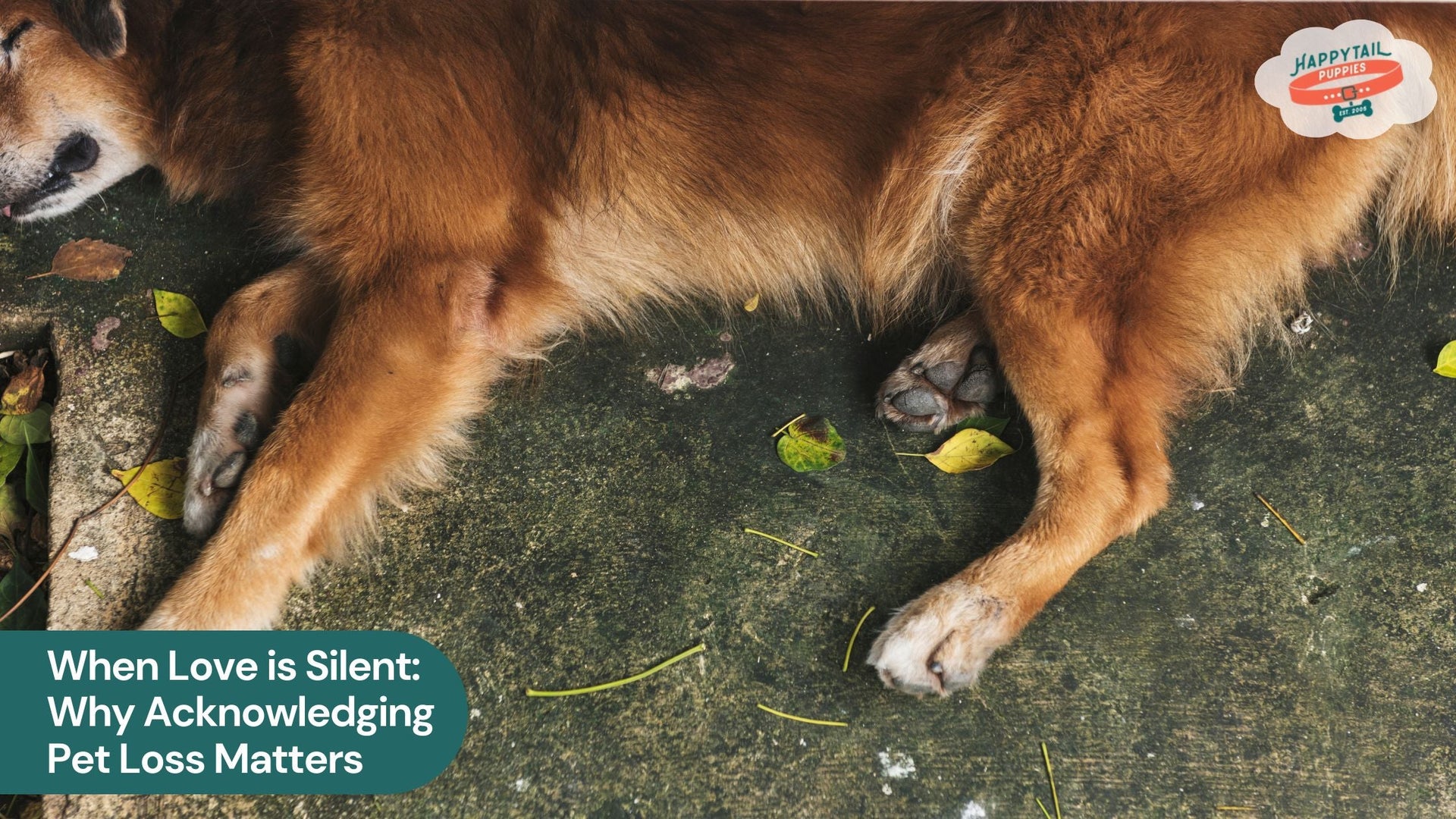When Love is Silent: Why Acknowledging Pet Loss Matters
Losing a pet is profound grief, often downplayed by society. Understand the stages of pet loss, the importance of compassionate acknowledgment, and healing strategies.
Pet parents understand the amount of grief they have to feel when losing their forever companions. Dogs, known as "Man's Best Friend," dedicate their lives only to please their owners with their loyalty and affectionate nature. For humans, pets are an integral part of their lives and households. Their absence creates a huge void in a similar way to losing their loved one.
Some studies show that about 70% of the pet owners consider their pets as family members, which truly highlights the reason why their loss triggers intense emotions.
Above all, the society we live in today frequently downplays pet grief, causing individuals to carry the burden of pain in silence. Recognizing this loss helps the emotional healing process, and honoring the deep bond shared with a beloved companion, such as the gentle Bichon Frise, is a noteworthy way to add lasting joy to countless families.
So, before we get into the thorough details of the topic, let us first understand the different phases of pet loss grief!
Understanding the Stages of Pet Loss Grief
Pet loss grief typically surfaces in different stages, and each phase has its share of emotional challenges. Pet parents can recognize these phases to accept their existing feelings. This directly helps to deal with the loss with patience and compassion.
- Denial: This is a phase that triggers a sense of disbelief where the whole mind grapples with accepting the fact that your pet is no longer alive. Daily routines appear incomplete while memories become surreal and vivid.
- Anger: Resentment, guilt, or frustration arises in this stage. Individuals may direct this anger on others, even on themselves, or the circumstances revolving around the loss of their pet, as a mode of processing this pain.
- Bargaining: This phase is primarily dominated by overwhelming thoughts of "if only." Humans start to replay the scenarios, wishing they could have done something to try to extend their pets' lives or prevent this enduring loss through different actions or preferences.
- Depression: As the reality starts surfacing about this loss, a sense of sadness occupies the minds of the pet owners. This is the stage that brings tears, withdrawal from the present, and incomplete routines with the loss of their beloved pet.
- Acceptance: Reaching this stage need not imply forgetting about the past moments spent with your pet. It consists of your venture to find peace in their absence; however, continuing to cherish their memory and moving forward with your life with gratitude for the bond you shared with your furry companion.
Why Pet Loss Deserves Compassionate Acknowledgment
Pet owners can try an approach that includes straightforward symbolic gestures, such as planting flowers or creating a memorial for their pet. You can find numerous platforms, like Pet Perennials, offering a subtle way to build a new life while cherishing the memory of your furry, forever companion.
Pets Are Family in Every Sense
Pets often rival human relationships, highlighting the huge importance they hold in one's life. These adorable pups offer emotional stability, lifelong companionship, and shower your life with unconditional love, fostering a huge sense of connection. The bond often shapes celebrations and routines while redefining severe life decisions. Choosing a pet involves several key considerations, including making informed decisions among various factors, understanding why a health guarantee is important for your peace of mind, and receiving reassurance regarding the future care and well-being of your pet.
Their loss often builds an emotional gap where once their presence offered a familiar warmth. Identifying your pets as family members validates the grief arising out of their absence and helps people undergo a smooth therapeutic process without being struck with pain forever.
Society Often Overlooks This Grief
The cultural attitudes on losing a pet often neglect it as less significant than any human bereavement. The growing awareness of pet loss, as well as conversations around responsible pet ownership, is also witnessing an uprise. Considering different options, such as pet insurance, becomes a matter of how people deal with and prepare for the possible challenges that come with owning a future pet.
Less grief often leads individuals to hide their emotions or avoid sharing about their pain due to the fear of judgment. As society begins to acknowledge pet loss as a genuine form of mourning, mourners appear empowered to seek help and heal more completely.
Support and Rituals Help Heal the Heart
The process of grief associated with the loss of a pet demands such a setting; a setting in which one might express oneself without being judged. Silence is replaced with conversation with friends, family, or professional counselors, where grief can be discussed.
Creating memorials provides comfort to many people who have lost a beloved Shih Tzu or a small companion animal. Activities such as planting a tree or having a favorite photo framed can assist in the grieving process by allowing individuals to honor the memory of their pet and, more importantly, release their emotions.
Children Experience Pet Loss Differently
Pets can act as playmates, guardians, and confidants among children. Their loss can be confusing, depressing, or fearful as children attempt to derive meaning out of unknown emotions out of death.
An analysis by the Massachusetts General Hospital discovered that pet death may lead to mental health problems in children, and that grief reactions may take longer than three years in some cases.
Helping children navigate this experience by being honest in a gentle manner would help them realize that grief is a natural part of the process. Through creative activities such as drawing or storytelling, they will be able to express themselves and maintain good memories of the pet they had.
Grief Looks Different for Everyone
The experiences of grief are never the same for all individuals. Others might be willing to get another pet shortly, while some might not consider such a move for years.
Reaching out with respect to these differences is free of judging and does not impose timelines on healing. Being empathetic and patient listeners will help you assist anyone trying to cope with the deep feelings that accompany the death of a pet.
Conclusion
Pet loss is something that also results in a particular type of grief that must be treated with respect and empathy. The affection exchanged with a pet runs deep, and their loss often leaves emotional scarring that is much more profound than the physical scarring. This mourning acknowledges the relationship and makes room for real healing to be possible. Recognizing the loss of a pet teaches us to appreciate the connections of all kinds and respect all the bonds we have, grieving with love.


